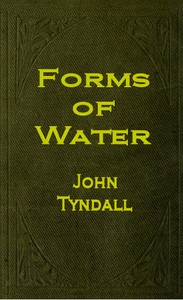The Forms of Water in Clouds and Rivers, Ice and Glaciers by John Tyndall
Read now or download (free!)
| Choose how to read this book | Url | Size | ||||
|---|---|---|---|---|---|---|
| Read online (web) | https://www.gutenberg.org/ebooks/63803.html.images | 384 kB | ||||
| EPUB3 (E-readers incl. Send-to-Kindle) | https://www.gutenberg.org/ebooks/63803.epub3.images | 2.3 MB | ||||
| EPUB (older E-readers) | https://www.gutenberg.org/ebooks/63803.epub.images | 2.3 MB | ||||
| EPUB (no images, older E-readers) | https://www.gutenberg.org/ebooks/63803.epub.noimages | 199 kB | ||||
| Kindle | https://www.gutenberg.org/ebooks/63803.kf8.images | 1.7 MB | ||||
| older Kindles | https://www.gutenberg.org/ebooks/63803.kindle.images | 1.7 MB | ||||
| Plain Text UTF-8 | https://www.gutenberg.org/ebooks/63803.txt.utf-8 | 303 kB | ||||
| Download HTML (zip) | https://www.gutenberg.org/cache/epub/63803/pg63803-h.zip | 2.6 MB | ||||
| There may be more files related to this item. | ||||||
About this eBook
| Author | Tyndall, John, 1820-1893 |
|---|---|
| Title | The Forms of Water in Clouds and Rivers, Ice and Glaciers |
| Credits |
Produced by Tom Cosmas produced from files generously provided on The Internet Archive. All resultant materials are placed in the Public Domain. |
| Summary | "The Forms of Water in Clouds and Rivers, Ice and Glaciers" by John Tyndall is a scientific publication written in the late 19th century. The author explores the intricate relationships between various forms of water in nature, illustrating concepts related to clouds, rivers, and glaciers through a combination of observation, experimental results, and theoretical discussions. The book serves as an accessible introduction to the phenomena surrounding water in its different states, as well as the scientific principles underlying them. The opening of the text establishes a thoughtful and engaging narrative about the connections between natural occurrences. Tyndall begins by discussing the origins of rivers, emphasizing that they derive from rain which in turn comes from clouds—explaining this cycle with clear, relatable observations. He introduces readers to the mechanisms behind rainfall and snow through discussions of condensation and the sun's role in promoting evaporation, with a focus on observable phenomena like clouds forming above a locomotive or the behavior of steam. This introductory portion sets the stage for a deeper exploration of glacial movements and the physical laws governing these natural processes, all while maintaining an approachable style aimed at widening public understanding of science. (This is an automatically generated summary.) |
| Language | English |
| LoC Class | QE: Science: Geology |
| Subject | Rivers |
| Subject | Clouds |
| Subject | Ice |
| Subject | Glaciers |
| Subject | Water |
| Category | Text |
| EBook-No. | 63803 |
| Release Date | Nov 18, 2020 |
| Copyright Status | Public domain in the USA. |
| Downloads | 89 downloads in the last 30 days. |
| Project Gutenberg eBooks are always free! | |

